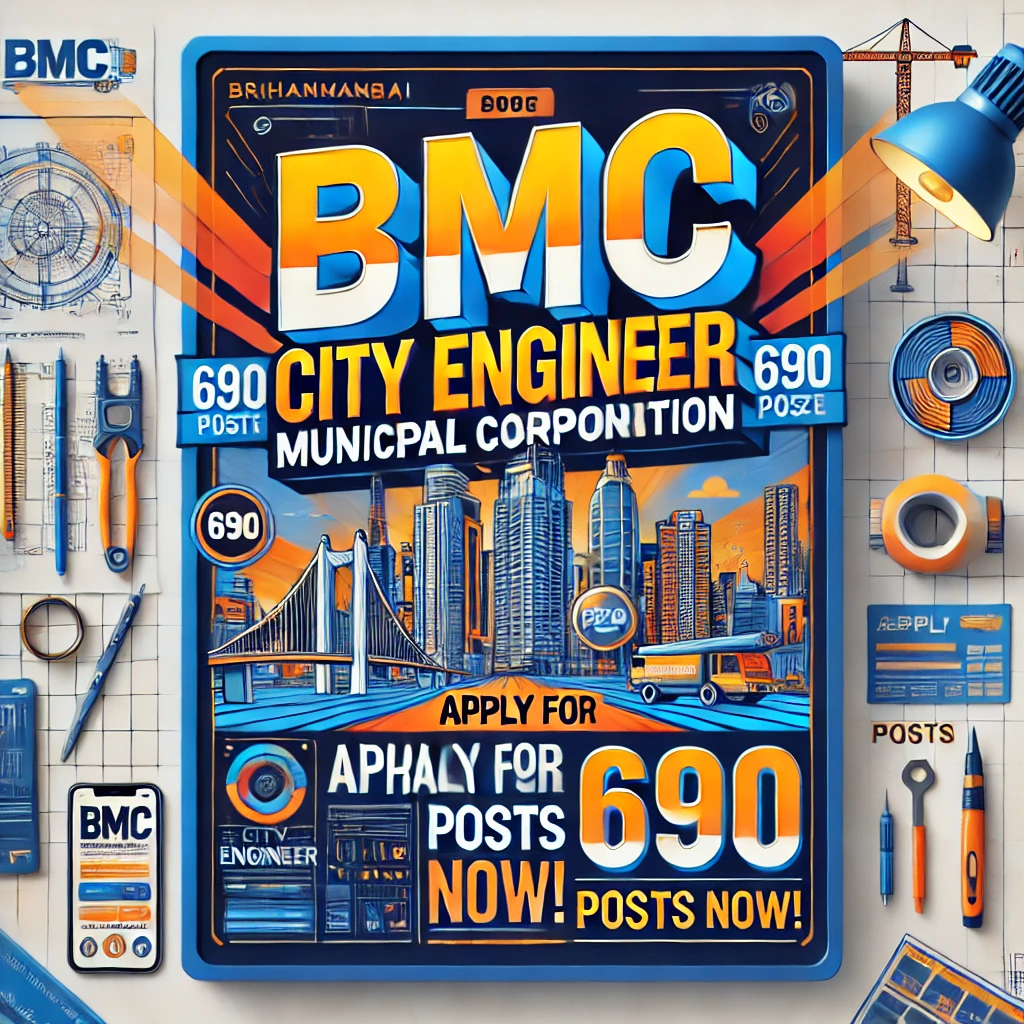BMC JE-SE Syllabus, The BMC JE-SE (Junior Engineer-Sub Engineer) exam is a gateway to a prestigious career in civil, mechanical, electrical, or architectural engineering under the Brihanmumbai Municipal Corporation (BMC). A thorough understanding of the syllabus can significantly boost your chances of success. Let’s dive into the well-structured and detailed syllabus for BMC JE-SE across all disciplines.
Table of Contents
1. BMC JE-SE Syllabus for Civil Engineering
Civil engineering forms the backbone of urban development. The syllabus focuses on crucial topics like:
- Building Construction & Materials: Concrete properties, mix designs, and building services like water supply and lighting.
- Strength of Materials: Analyze stress, strain, bending moments, and buckling theories.
- Theory of Structures: Beam and truss analysis, moment distribution method.
- Design of Structures: Steel and RCC structures, including beams, slabs, and retaining walls.
- Surveying: Levelling, tacheometry, and photogrammetry for accurate measurements.
- Highway & Bridge Engineering: Design, alignment, and construction techniques.
- Environmental Engineering: Water supply systems, wastewater treatment, and pollution control.
These topics emphasize practical knowledge essential for modern infrastructure development.
2. BMC JE-SE Syllabus for Mechanical & Electrical Engineering
The mechanical and electrical syllabus integrates core engineering principles and advanced technologies.
- Mechanical Engineering Fundamentals: Manufacturing processes like forging and casting, machine tool design, and thermodynamics.
- Theory of Machines & Design: Study gear drives, coupling, shafts, and springs for efficient mechanical operations.
- Fluid Mechanics: Understand pumps, hydraulic gradients, and Reynolds numbers.
- IC Engines & Refrigeration: Thermal cycles, engine efficiency, and air-conditioning systems.
- Electrical Engineering Essentials: AC/DC systems, motor protection, and power transmission systems.
- Automation & Digital Systems: Ladder logic programming, SCADA, and power electronics.
Mastery of these areas ensures proficiency in modern engineering systems and energy-efficient practices.
3. mcgm JE-SE Syllabus for Architecture
Architectural engineers play a pivotal role in urban planning and sustainable development.
- Regional & Development Planning: Conduct surveys, prepare regional plans, and analyze implementation strategies.
- Town Planning Schemes: Land use mapping, cost estimation, and arbitrator roles.
- Building Permissions: Study building byelaws, FSI (Floor Space Index), and TDR (Transfer of Development Rights).
- Transportation Planning: Public transport, road classification, and aviation needs.
- Environmental Aspects: Adherence to environmental protection acts and sustainable urban development.
This segment focuses on creating urban spaces that blend functionality with sustainability.
Key Highlights of mcgm JE-SE Syllabus
- Over 100 topics covering civil, mechanical, electrical, and architectural disciplines.
- Includes modern technologies like SCADA, automation, and energy-efficient systems.
- Balanced focus on practical application and theoretical understanding.
Why This Syllabus is a Game-Changer?
- Holistic Coverage: Encompasses all essential topics for engineers to excel in municipal services.
- Practical Relevance: Focus on real-world applications like infrastructure development and energy conservation.
- Opportunities for Specialization: Dedicated sections for civil, mechanical, electrical, and architectural engineering.

Preparation Tips for BMC JE-SE Exam
- Prioritize Topics: Focus on high-weightage areas like structural design, fluid mechanics, and surveying.
- Use Standard Texts: Refer to books like R.K. Bansal for strength of materials or NPTEL resources for advanced topics.
- Practice Numericals: Ensure clarity in solving complex calculations and design problems.
- Mock Tests & PYQs: Solve previous years’ questions to understand the pattern and difficulty level.
Final Thoughts
The BMC JE-SE syllabus is extensive, covering a broad spectrum of engineering concepts. With the right preparation strategy, you can excel in this exam and embark on a rewarding career in municipal engineering. Embrace the challenge, and let this syllabus be your roadmap to success!
FAQs on BMC JE-SE Syllabus
Here are some commonly asked questions about the BMC JE-SE Syllabus and exam preparation:
1. What is the BMC JE-SE exam?
The BMC JE-SE (Junior Engineer-Sub Engineer) exam is conducted by the Brihanmumbai Municipal Corporation (BMC) to recruit engineers in civil, mechanical, electrical, and architectural fields for municipal services.
2. What are the key topics covered in the BMC JE-SE syllabus?
The syllabus varies by discipline, but here are the highlights:
- Civil Engineering: Building materials, structural design, surveying, environmental engineering.
- Mechanical & Electrical Engineering: Fluid mechanics, IC engines, power transmission, automation.
- Architecture: Regional planning, building permissions, town planning schemes, environmental aspects.
3. Are there any modern topics included in the syllabus?
Yes, the syllabus incorporates modern and emerging technologies such as:
- Automation & PLC: Ladder logic programming, SCADA systems.
- Energy Efficiency: Solar lighting, energy audits, and renewable energy.
- Urban Development: Sustainable planning and smart city concepts.
4. How can I prepare for the BMC JE-SE exam effectively?
Here are some tips:
- Prioritize high-weightage topics like structural analysis, fluid mechanics, and surveying.
- Use standard textbooks like R.K. Bansal for strength of materials or R.K. Jain for surveying.
- Practice numerical problems and mock tests regularly.
- Solve previous years’ question papers to understand the pattern.
5. What is the exam pattern for BMC JE-SE?
The exam typically consists of objective-type questions covering technical and general knowledge. The exact pattern may vary depending on the notification.
6. Is the syllabus the same for all engineering streams?
No, the syllabus is tailored to each stream:
- Civil Engineering: Focuses on construction, materials, and environmental engineering.
- Mechanical & Electrical Engineering: Emphasizes machines, thermodynamics, and electrical systems.
- Architecture: Covers urban planning, building byelaws, and environmental sustainability.
7. Are any specific codes or standards included in the syllabus?
Yes, the syllabus mentions specific codes and standards such as:
- IS 3043: For electrical grounding and earthing systems.
- National Building Codes (NBC): For building services, ventilation, and safety.
8. Does the syllabus include environmental engineering topics?
Yes, environmental engineering is an important component for civil and architectural streams. Topics include:
- Water supply and wastewater treatment.
- Pollution control measures for air, water, and noise.
- Solid waste management and environmental protection acts.
9. Are digital systems and electronics included in the syllabus?
Yes, particularly for mechanical and electrical streams. Topics include:
- Logic gates, Boolean algebra, and flip-flops.
- Power electronics (SCR, MOSFET).
- Digital instruments and SCADA systems.
